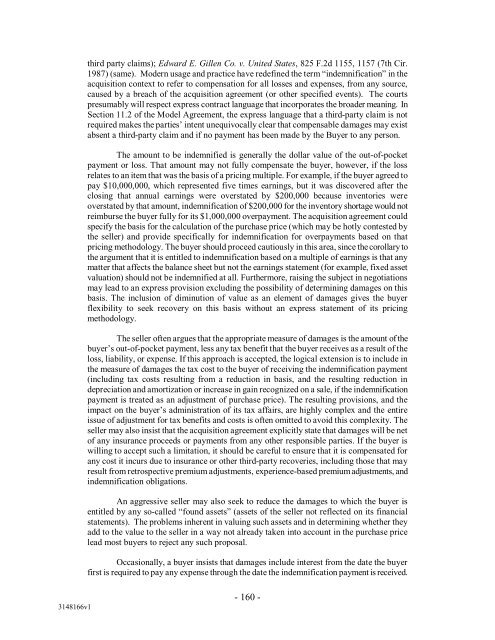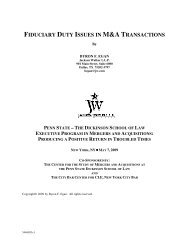asset acquisitions - Jackson Walker LLP
asset acquisitions - Jackson Walker LLP
asset acquisitions - Jackson Walker LLP
You also want an ePaper? Increase the reach of your titles
YUMPU automatically turns print PDFs into web optimized ePapers that Google loves.
third party claims); Edward E. Gillen Co. v. United States, 825 F.2d 1155, 1157 (7th Cir.1987) (same). Modern usage and practice have redefined the term “indemnification” in theacquisition context to refer to compensation for all losses and expenses, from any source,caused by a breach of the acquisition agreement (or other specified events). The courtspresumably will respect express contract language that incorporates the broader meaning. InSection 11.2 of the Model Agreement, the express language that a third-party claim is notrequired makes the parties’ intent unequivocally clear that compensable damages may existabsent a third-party claim and if no payment has been made by the Buyer to any person.The amount to be indemnified is generally the dollar value of the out-of-pocketpayment or loss. That amount may not fully compensate the buyer, however, if the lossrelates to an item that was the basis of a pricing multiple. For example, if the buyer agreed topay $10,000,000, which represented five times earnings, but it was discovered after theclosing that annual earnings were overstated by $200,000 because inventories wereoverstated by that amount, indemnification of $200,000 for the inventory shortage would notreimburse the buyer fully for its $1,000,000 overpayment. The acquisition agreement couldspecify the basis for the calculation of the purchase price (which may be hotly contested bythe seller) and provide specifically for indemnification for overpayments based on thatpricing methodology. The buyer should proceed cautiously in this area, since the corollary tothe argument that it is entitled to indemnification based on a multiple of earnings is that anymatter that affects the balance sheet but not the earnings statement (for example, fixed <strong>asset</strong>valuation) should not be indemnified at all. Furthermore, raising the subject in negotiationsmay lead to an express provision excluding the possibility of determining damages on thisbasis. The inclusion of diminution of value as an element of damages gives the buyerflexibility to seek recovery on this basis without an express statement of its pricingmethodology.The seller often argues that the appropriate measure of damages is the amount of thebuyer’s out-of-pocket payment, less any tax benefit that the buyer receives as a result of theloss, liability, or expense. If this approach is accepted, the logical extension is to include inthe measure of damages the tax cost to the buyer of receiving the indemnification payment(including tax costs resulting from a reduction in basis, and the resulting reduction indepreciation and amortization or increase in gain recognized on a sale, if the indemnificationpayment is treated as an adjustment of purchase price). The resulting provisions, and theimpact on the buyer’s administration of its tax affairs, are highly complex and the entireissue of adjustment for tax benefits and costs is often omitted to avoid this complexity. Theseller may also insist that the acquisition agreement explicitly state that damages will be netof any insurance proceeds or payments from any other responsible parties. If the buyer iswilling to accept such a limitation, it should be careful to ensure that it is compensated forany cost it incurs due to insurance or other third-party recoveries, including those that mayresult from retrospective premium adjustments, experience-based premium adjustments, andindemnification obligations.An aggressive seller may also seek to reduce the damages to which the buyer isentitled by any so-called “found <strong>asset</strong>s” (<strong>asset</strong>s of the seller not reflected on its financialstatements). The problems inherent in valuing such <strong>asset</strong>s and in determining whether theyadd to the value to the seller in a way not already taken into account in the purchase pricelead most buyers to reject any such proposal.Occasionally, a buyer insists that damages include interest from the date the buyerfirst is required to pay any expense through the date the indemnification payment is received.3148166v1- 160 -
















